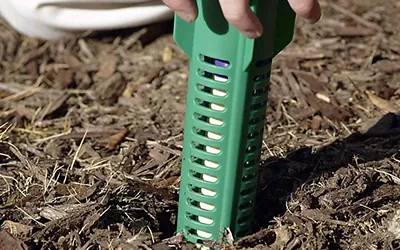
Coming across signs of termite activity in your home can be alarming, but that doesn’t always mean you have to panic. Understanding the various termite treatment options available is the first step toward protecting your property from these destructive pests. If you think you have termites, here’s what you need to know about your treatment options.
Common Termite Treatments
Termite infestations can pose a significant threat to the structural integrity of your home. Fortunately, several termite treatment options are available to homeowners seeking to protect their properties from these destructive pests. Here are the two most common termite treatment methods and how they work:
- Liquid Termite Treatments: Liquid termite treatments are a traditional but reliable method for protecting homes against termite infestations. This approach involves applying termiticides to the soil around and beneath the foundation of the house, creating a chemical barrier that repels or kills termites upon contact. When termites come into contact with the treated soil, the termiticide disrupts their nervous system, leading to paralysis and eventual death. Additionally, some termiticides have repellent properties, deterring termites from tunneling into treated areas. Over time, the liquid treatment forms a protective zone around the property.
- Termite Baiting: Termite baiting is a proactive and targeted approach to termite infestation. Unlike traditional liquid treatments that create a barrier around the property, baiting systems strategically intercept termites before they breach the home’s defenses. This method involves placing bait stations containing enticing wood bait in key locations around the perimeter of the building. What sets termite baiting apart from conventional treatments is its precision and eco-friendly nature. Instead of saturating the soil with chemical barriers, baiting specifically targets termite colonies. The bait acts as an irresistible lure, enticing termites to consume it and share it with their nestmates, ultimately leading to the eradication of the entire colony.
Need an Estimate for a Termite Inspection?
What’s the Best Termite Treatment?
When it comes to termite control, homeowners often wonder which method is going to get rid of the infestation the fastest. While both liquid termite treatments and baiting systems have their merits, one approach stands out as the most effective solution for treating termite infestations: baiting.
When it comes to treating an existing termite infestation, baiting systems offer unparalleled effectiveness. Unlike liquid treatments, which primarily serve as preventive measures, baiting specifically targets termite colonies, leading to their eradication.
Termite baiting operates on the principle of using attractive bait to lure termites away from the structure. Once termites consume the bait, they carry it back to the colony, where it is shared among nestmates. Over time, the bait disrupts the termite population, ultimately leading to the collapse of the colony.
This targeted approach not only eliminates existing termite colonies but also prevents future infestations by disrupting the reproductive cycle of termites. Additionally, baiting systems like the Sentricon® Termite Colony Elimination System offer long-term protection, with bait stations remaining active for extended periods.
Professional Termite Removal Services
When considering termite treatment options, it’s essential to consult with a pest control professional to assess your specific needs and recommend the most suitable solution for your home. With expert guidance and tailored solutions, you can effectively combat termite infestations and protect your investment for years to come.
With Russell’s Pest Control, you can enjoy continuous protection against termites, targeted eradication of existing colonies, and peace of mind knowing that your home is in expert hands. Don’t wait until the termite damage is severe—contact us today to schedule a consultation and take the first step towards termite-free living.
Back to Termite Exterminators – Control – RemovalTermite Baiting vs Liquid Treatments in Knoxville TN
Serving East Tennessee since 1971